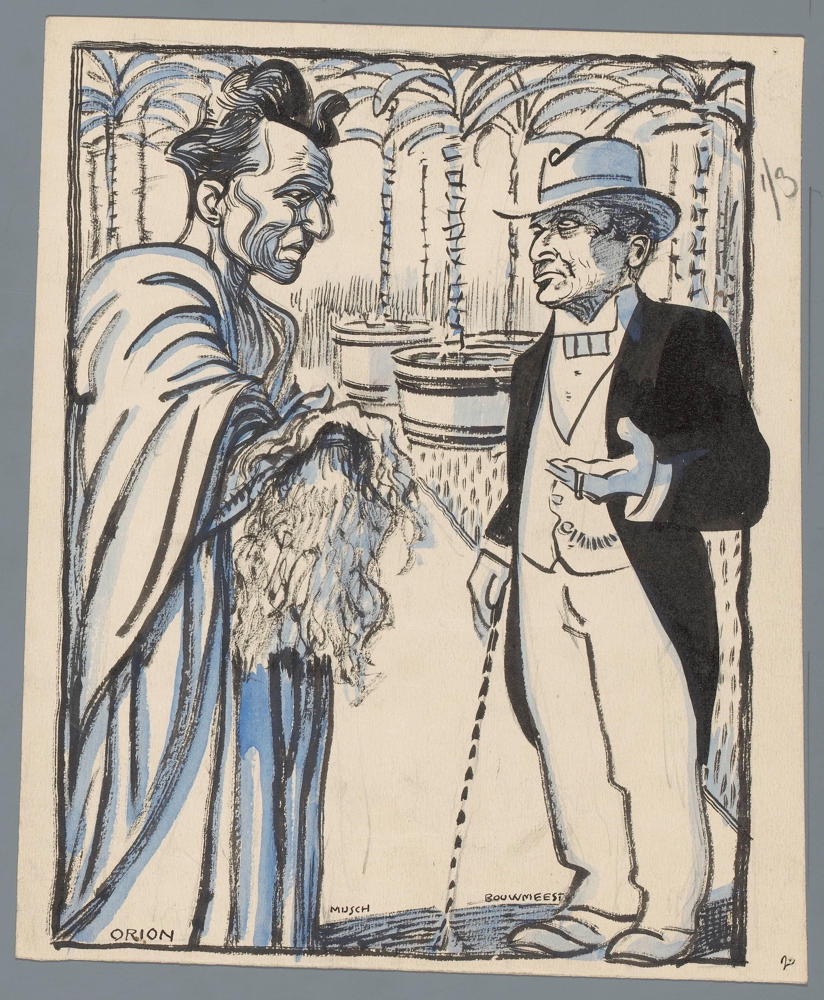Situationalism

Patricq Kroon: Musch and Bouwmeester (1900 - 1924)
The actors Jan Musch and (Louis?) Builder in conversation with each other. Design for a cartoon in the newspaper.
"Perhaps I should be indicting myself."
Maybe Decency should only be exercised situationally. Perhaps it’s a Sunday sort of behavior. Certainly, considerable ambiguity surrounds its appropriate use. One might not want to waste any on enemies, for instance. Perhaps only certain people are qualified to receive it, and maybe not everybody’s fully certified to properly dispense it. Maybe it requires some skill to properly deploy. Should rank amateurs even be allowed to engage in it? What if they were to accidentally extend some Decency to someone unqualified to receive it, someone, for instance, who couldn’t properly appreciate it? Couldn’t the resulting misunderstanding leave the world worse off for the experience? Might indiscriminate Decency cause real and lasting damage, not only to the practitioner but also to the unwitting receiver? What if we inadvertently spoil some hapless receiver into expecting to always receive Decency in a naturally hard and increasingly indifferent world?
I might needlessly worry about such questions. What if Decency couldn’t possibly be situational? What if it could never be out of context? What if it served as the baseline unconditional extension, one offered regardless of extenuating circumstances? You say that might damage some competitive advantage? Must every encounter be reduced to competition? Who wins then? What’s reliably lost?
My moral guidance seems ambiguous. I might believe that all people are created equal, that we exist together on a vast level playing field, but then begin making exceptions, but only for the very best reasons. I might gleefully engage in so-called “cut-throat competition,” and firmly believe that it’s my moral obligation because competition serves as the first principle underpinning free market capitalism. I might usually be decent except when engaging in serious business. I say, “It’s only business,” as if that explanation provided an adequate exception. What other exceptions do I routinely apply?
I try to pass as if I might be in danger should a stranger or even a friend discover what I believe in. I try to remain neutral in public, avoiding eye contact as if invisible. I tell myself that I’m only being agreeable, striving to stay inoffensive, but perhaps I’m pensive to a fault. It’s tough to stand up for anything when I’m invisible, and even more so when I’m safeguarding a secret self whenever I venture out in public. What might scream my downright Decency? What might clearly communicate an intention to be unconditionally Decent to everybody regardless of position or prejudice? I don’t know how to answer to this question.
I suspect that many have been grieving the apparent disappearance of Decency. I suspect that it’s just gone to ground in the belief that it’s too risky to spread too much of it around. I cannot be found guiltless simply because I didn’t vehemently weigh in on the side of Decency. A particular passion might be necessary for Decency to seem as if it’s not disappearing. What outward sign of my inward Decency might more clearly demonstrate my fealty to it in ways more explicit than my public invisibility? If I don’t expose myself with potentially risky behavior where will my Decency lie?
I can’t insist that Decency must be unconditional. It might well be situational, though I’m failing to understand the damage profligately extending Decency might inflict on me or on anybody else. Decency might even serve as its own defense, better able to deflect than any alternative form of engagement. I do know that it’s suddenly become stylish to be routinely cruel, to jeer, and so-called make fun of others, especially toward those who seem to so deeply deserve our animosity. Maybe I could stand opposed without withdrawing some level of Decency, for who might I become should I lose the ability to extend Decency for mere lack of practice?
It might be that we believe Decency has been depleted because we don’t readily recognize it in practice, perhaps because we’re rather out of practice, ourselves. Can I disagree agreeably, or must I at least attempt to savage every apparent opponent? I feel guilty, if unindicted. Perhaps I should be indicting myself.
©2025 by David A. Schmaltz - all rights reserved


